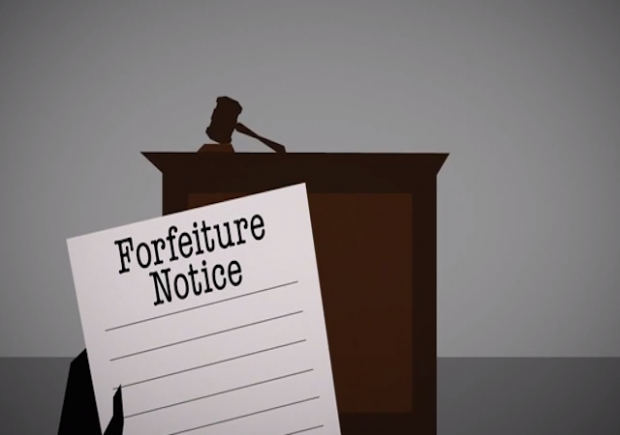
Has your personal property been naughty lately? If so, it could be sued by federal, state, and municipal governments resulting in a good ole bona fide Fourth Amendment seizure. Also known as civil forfeiture, the practice has been around for decades. Although once generally limited to suspected drug dealers, with increasing bureaucratic budget shortfalls, its’ becoming widely used by government agencies as a source of department revenue across the nation.
Civil Forfeiture on the Federal Level
Civil forfeiture is codified on the federal level by 18 U.S.C. § 981 (paralleling 18 U.S.C. § 982) and 21 U.S.C. § 881.[1] Essentially, the government initiates civil actions against the property itself, not the owner to remedy a harm, through the fiction of the property’s “guilt.”[2] The result, if your property has been naughty – I.e., involved in or an instrumentality to a crime – it may be seized by the government without its’ owner (you) ever being charged or convicted of a crime. With regards to the guilt or lack thereof of the property’s owner, the Supreme Court ruled that Due Process does not require pre-seizure notice or hearing, and that the innocence of the owner is not a general defense.[3] What’s worse, state and local governments have since jumped on the bandwagon implementing their own form of civil forfeiture laws punishing naughty property by seizing it, selling it for 100% profit, and then incorporating the funds into their general operating budget.

Civil Forfeiture on State and Local Levels
Originally the law was designed to give the federal government the authority to seize drug kingpin property used in illegal drug trafficking. For instance, if a drug trafficker was using his private plane or boat to transport narcotics, under the; RICO, Criminal and Drug Forfeiture Acts, the Feds could legally confiscate those items in order to prevent further trafficking. However recently, state and local level civil forfeiture laws have given local police departments the authority to forfeit personal items such as a jewelry, cash, homes and essentially anything else that can be sold. As noted, though the property owners are never charged, local & state agencies can bring action against the item itself leading to nonsensical forfeiture case names such as State of Texas vs. One Gold Crucifix or South Dakota v. Fifteen Impounded Cats.[4]
Here, in State of Texas vs. One Gold Crucifix, the “police confiscated a simple gold cross that a woman wore around her neck after pulling her over for a minor traffic violation.” [5] Since the defendant in civil forfeiture cases is the property itself, the rights of the owner have no bearing on the outcome. As a result, many individuals whose property is confiscated simply choose not to fight due the high costs of legal fees.
Further, one jurisdiction in particular, Philadelphia, PA, engages in the most notorious and aggressive civil forfeiture tactics in the country. Specifically, in a recent case involving a couple whose son was caught selling $40 worth of narcotics outside their family home, Philadelphia authorities sought to confiscate the couple’s entire home, sell it at auction, then retain the profits. As a result, The Institute for Justice has taken on the couples – and others similarly situated – case(s) filing a class action lawsuit seeking an injunction against the City of Philadelphia to halt what it refers to as “violations of rights guaranteed by the Due Process Clause of the Fourteenth Amendment.”
Defenses to Civil Forfeitures
As noted, unless provided by statute, the innocence of the owner is generally not a defense to a civil forfeiture. Even where statutory defenses are available, they are narrowly construed by the courts. [6] For example, “courts may apply an objective standard to determine if the owner should have had knowledge of the property’s illegal use, rather than require proof of actual knowledge.”[7]
In certain situations, owners may be able to argue that if no crime occurred, the government lacks probable cause, “or that the property is not closely enough connected to the crime to be considered an instrumentality or proceeds.”[8] Even where the government is required to return the property seized, it is not liable for any further damages resulting from its confiscation, nor any interest ordinarily accrued on actual forfeited funds.
Proposed changes
On the national level there has been chatter on reforming federal civil forfeiture statutes however not much has been done. There is bi-partisan support for the proposed Civil Asset Forfeiture Reform Act proposed by Tim Walberg (R-Mich) however it faces an uphill battle in the Judiciary Committee.
Currently, North Carolina is the only state in the country that prohibits civil forfeiture unless the owner of the property has been convicted of a crime. A state lawmaker in Virginia, Delegate Mark Cole, is proposing legislation in the 2015 general assembly to curtail current civil forfeiture statutes.[9] Hopefully other lawmakers will catch on as this little known, seemingly secret process is being brought to light.

Conclusion
If your property has been naughty or even has the inclination of naughtiness, have a sit down with it and explain the ramifications of its behavior. If that sounds ludicrous, so does the governments rationale for seizing it! My theory is that since this practice was primarily directed at inner-city “drug dealers” many Americans simply didn’t care. Once its pervasiveness started sprawling into suburban America, it now has become a problem that needs reform. It’ll be interesting to see how much government the limited government folks will tolerate once their loved ones and neighbors are affected.
[1] Forfeiture | Wex Legal Dictionary / Encyclopedia | LII / Legal Information Institute, , http://www.law.cornell.edu/wex/forfeiture (last visited Nov 6, 2014).
[2] Id.
[3] Calero Toledo v. Pearson Yacht Leasing Co., 416 U.S. 663 (1974).
[4] Civil forfeiture perverts justice – Technician: Opinion, , http://www.technicianonline.com/opinion/article_f07018ae-5a60-11e4-a320-0017a43b2370.html (last visited Nov 6, 2014).
[5] Id.
[6] Forfeiture | Wex Legal Dictionary / Encyclopedia | LII / Legal Information Institute, supra note1.
[7] Id.
[8] Id.
[9] State lawmaker targets civil forfeiture | Alexandria Times, , http://alextimes.com/2014/10/state-lawmaker-targets-civil-forfeiture/ (last visited Nov 6, 2014).